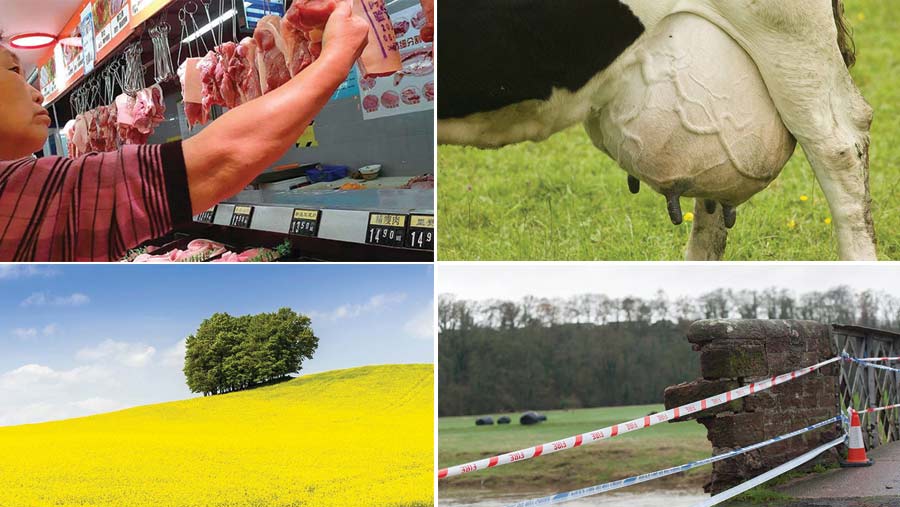2015 – The farming year in brief
 ©Rex Shutterstock
©Rex Shutterstock It was a year of crises and price as volatility and weather woes took their toll.
Lamb and dairy farmers struggling to stay in business swapped parlours for pavements, taking animals into supermarkets and on to the streets of London to help raise public awareness of their plight.
Meanwhile sheep farmers fighting for recognition of organophosphates poisoning were glad to see the unearthing of a ‘lost’ OP report.
And there was some good news for oilseed rape growers, who were granted an emergency application to use neonicotinoid seed treatments on 5% of the total area.
See also: Livestock auction highs and lows of 2015
January
No dairy crisis, insists commissioner
Despite plummeting returns for farmers, EU farm commissioner Phil Hogan says he is “satisfied there is considerable profitability still in the dairy sector and there is no crisis”.
The average EU milk price was still up at 32c/litre (24p/litre) in November, he adds, and global dairy auctions had risen in recent weeks.
February
NFU calls for support against volatility
Meurig Raymond ©Rex Shutterstock
NFU president Meurig Raymond calls on the government to help producers address volatility.
Producers are feeling the impact as protectionist policies which once cushioned them from price fluctuations are dismantled, says Mr Raymond: “This is the consequence of decisions taken at international, European and national level,” he adds.
March
‘Lost’ OP sheep dip report unearthed
A Freedom of Information request uncovers a government agency report examining the impact of organophosphate sheep dip on human health.
Campaigners say it strengthens their case for government recognition that farmers were poisoned by the chemicals.
April
UK milk production hits 20-year high
UK dairy farmers produced 14.394bn litres in the final year of milk quota. Milk production totalled 1.262bn litres in March – 5m litres above last year.
Daily deliveries in the fortnight to 4 April showed production continued to run ahead, at 41.4m litres/day. However, with 15.293bn litres of quota available at the start of the year, the UK ends the final season comfortably under quota.
May
Family farms lack succession plans
More than 60% of UK farming families do not have a written succession plan, reveals a survey by Farmers Weekly and NFU Mutual.
Lack of communication and a desire to avoid conflict are among the biggest reasons for neglecting to plan, even though 64% of families admit that the absence of such a strategy threatens the future of the farm.
June
Defra pledges to boost self-sufficiency
George Eustice ©Tim Scrivener
After 30 years during which Britain’s self-sufficiency in food dropped from 78% to 60%, the government confirms a long-term strategy to increase food exports and open new markets.
“Self-sufficiency will go up as a product of having a vibrant and successful industry,” says farm minister George Eustice.
July
Emergency neonics application granted
An emergency application to use neonicotinoid seed treatments on oilseed rape this summer is approved for 5% of England’s total crop area.
Defra granted the NFU request despite opposition from environmental groups. But the derogation applies to only about 30,000ha of oilseed rape most at risk from cabbage stem flea beetle in East Anglia.
August
Cows in supermarkets make the headlines
Milk producer Matt Weaver and a 70-strong group of supporters lead two Holstein heifers into the Asda supermarket at Stafford.
Footage of Mr Weaver telling bemused shoppers: “The reason we are doing this is that milk is far too cheap,” are shown on national television. Photographs of the stunt are published in newspapers, on websites and on social media.
Meanwhile, Scott Ruck, manager of Belmont Farm in Mill Hill, north-west London, took a halter-trained Jersey cow and two sheep down Oxford Street to raise awareness of low milk and lamb farmgate prices.
September
Farmers take fight for fair prices to Brussels
British growers and livestock producers join more than 5,000 farmers from across Europe for a day of protest in Brussels.
The farmers call for help to ease the impact of Russian trade restrictions, market volatility and low food prices.
The European capital is brought to a standstill as the European Commission unveils a €500m support package. The UK’s £26.5m share goes mostly to milk producers.
October
China looks to Britain for pork
Britain becomes the sixth biggest pork exporter to China, as the Asian giant looks abroad to help plug its growing meat deficit.
China is expected to face a meat shortfall of 10m tonnes a year by 2020, as demand continues to outpace production.
The British pig industry exported about 42,000t to China last year, a growth of 443% since 2011.
November
Fears for farming as Defra budget cut
Agriculture is among the losers after a 15% cut to Defra’s budget in the government’s Spending Review and Autumn Statement, say industry leaders.
Some areas, such as forestry and flood defences, are protected, which suggests the axe will fall more heavily elsewhere to meet the 15% reduction target by 2019-20.
December
Water torture as Desmond storms in
Floods devastate farmland across the north of England, north wales and southern Scotland. Hundreds of livestock are feared dead, buildings flattened and bridges collapsed in the wake of Storm Desmond, which blasts Britain for two days.
At Honister, Cumbria, one month’s rain falls in just 24 hours.






